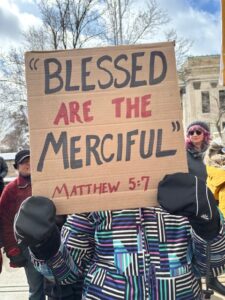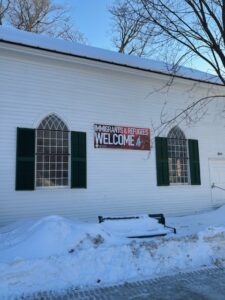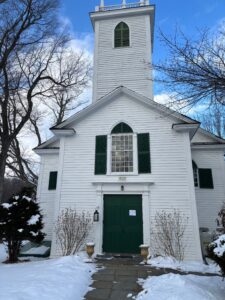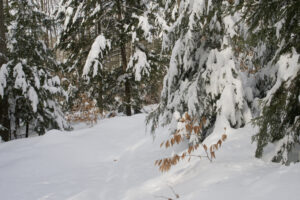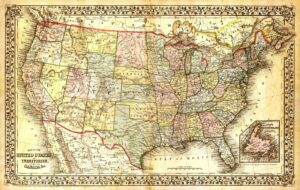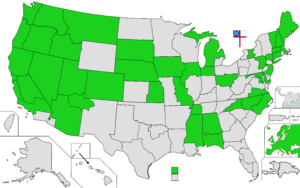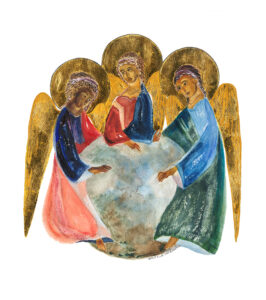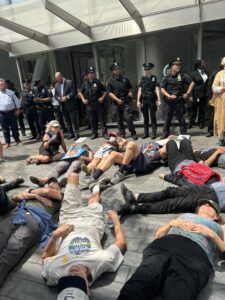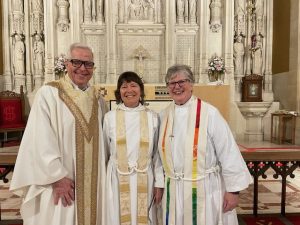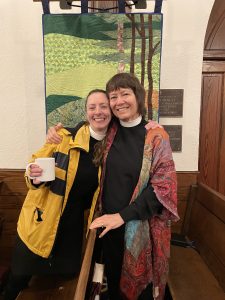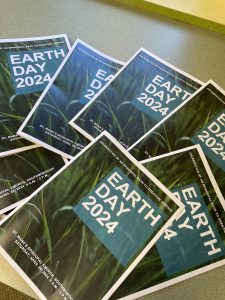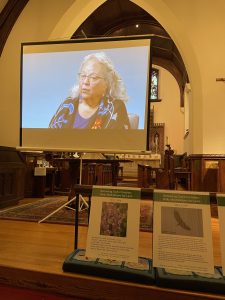This is a slightly adapted text for a video I created at the request of the Episcopal Church in Colorado as part of its Lenten series, “Journey through Lament: Leaning into the Brokenness of Our Communities and World.” The YouTube video is available here.
At the end of Morning Prayer and Evening Prayer, the officiant sometimes concludes the service with this line from Paul’s Letter to the Romans: “May the God of hope fill us with all joy and peace in believing, so that we may abound in hope by the power of the Holy Spirit” (Romans 15:13). Our God of hope wants us to abound in hope! Hope is one of the great Christian virtues, but honestly, given the social and ecological breakdown going on all around us, where do we find hope? How do we maintain it? Take climate change, for instance. The relentless extraction and burning of coal, gas, and oil is pushing our planet wildly out of balance. Every living system is in decline and the web of life is unraveling before our eyes. We now live in a world where atmospheric rivers can fill the sky and a month of rain can fall in one day; where wildfires can be so intense that they create their own weather; where hurricanes can be so fierce that we need to create new categories for storms.
What shall we say about hope? Hope is forward-facing – it’s the capacity to look toward the future with confidence that something good is ahead – but then we learn that by 2050, over a billion people could be displaced due to natural disasters and climate change.1 Or we learn that current global climate policies set the world on a path to heat by about 2.7 degrees Celsius by 2100, which would threaten modern human civilization within the lifespan of children born today.2 Hear things like that and it’s easy to be overcome by helplessness and by what theologian Sallie McFague calls a “crushing state of futility.”3 Say the word “hope” too glibly and it reeks of escapism and wishful thinking.
But I’m here to tell you that it’s precisely in a time like this, when the stakes are so high, that we need to recover the power of Christian hope.
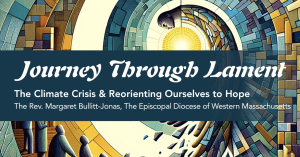 What happens in your body when you don’t feel hope? If you’re like me, you contract. When I go into a hopeless place about the climate crisis, I feel small, helpless, alone. There’s nothing I can do, nothing to be done, it’s all going to hell, and I might as well quit trying to change that – might as well curl up in a ball of anxiety and despair, or distract and numb myself – maybe with entertainment, a drink, shopping, something.
What happens in your body when you don’t feel hope? If you’re like me, you contract. When I go into a hopeless place about the climate crisis, I feel small, helpless, alone. There’s nothing I can do, nothing to be done, it’s all going to hell, and I might as well quit trying to change that – might as well curl up in a ball of anxiety and despair, or distract and numb myself – maybe with entertainment, a drink, shopping, something.
Hope feels different in the body. Hope expands us, it connects us, it moves us out of withdrawal into engagement, out of isolation into relationship. When we’re in a hopeful place, we find energy and courage to act. We know that what we do matters and that even if we can’t do everything, we won’t refuse to do the something that we can do.
How do we nourish hope? It helps to remember that hope does not exist on its own. St. Paul repeatedly links hope with other virtues, other powers of the soul, such as faith and love. In his First Letter to the Corinthians, he writes: “Faith, hope, and love abide, these three; and the greatest of these is love” (1 Corinthians 13:13). I imagine hope standing in the middle, holding hands with her two sisters – faith and love.
So, when we find ourselves in a hopeless place, it’s good to remember faith. Take hold of faith! Faith is confidence in things not seen (Hebrews 11:1), in the hidden God who sent us into this world, who is with us now, and who will welcome us home at our journey’s end. Hope arises from faith, because with the Unseen One who loves me, I can step into the future, asking: What shall we do together? I love You and I want to live and act in alignment with You. Even if I see no outward hope, my hope is in You. And I know that whatever happens, whether I live or die, I am yours (c.f. Romans 14:8).
Again, when we find ourselves in a hopeless place, it’s good to remember love. There is so much to love in this beautiful world of ours, so much that we want to save. We can’t save it all, but we can commit ourselves to saving everything we can. Likewise, we can hold in mind the young people in our lives with whom we have a heartfelt connection to the future. Our love for those young people strengthens our resolve to live and act in hope. We don’t want to fail them. We want to protect, as best we can, the conditions that will make their lives safe and peaceful and possible in the decades ahead. What do you love so much that you would give everything, perhaps your very life, to protect it?
And maybe we haven’t even met the ones who most count on us to be living signs of hope. Terry Tempest Williams writes, “The eyes of the future are looking back at us and they are praying for us to see beyond our own time. They are kneeling with hands clasped that we might act with restraint, that we might leave room for the life that is destined to come.”4
Christian hope, fortified by faith and love, can keep us steady in a turbulent time. Jesus sets before us a great hope that the reign of God will come on Earth. As long as we live, we intend to pray and work for God’s will to be done on Earth as it is in heaven. That’s our big mission, our constant hope, the hope that will never fade away. In the near term, our hopes must be flexible and multiple, like strategic plans that we change as needed while we carry out the larger mission. In the near term, hope is a shapeshifter: depending on outer circumstances, our hopes change; we hope for this, we hope for that, and our hopes ebb and flow, rise and fall, depending on how things are going and how things turn out. Of course, that’s life, that’s normal, that’s how it works, but if that kind of hope – hope in the things of this world – is all we’ve got, we are vulnerable to despair: if my candidate wins, if that policy passes, if my biopsy comes back clean – hurray! my hope is fulfilled! And if I don’t get the outcome I want, then my hope drains away. Unless I have some other, deeper source of hope, I bounce around like a little boat on the surface of the ocean.
Christian hope gives us the deep grounding we need: it springs from deep within us and is replenished day by day from our ongoing relationship with a God who loves us and all creation and who will never let us go. Christian hope sets us free to release the false hopes to which we’ve probably been clinging – hopes like: “When it comes to climate change, everything will turn out fine. Progress will continue. Experts will figure this out. Someone else will fix this.” Such idle hopes are fantasies that give hope a bad name – no wonder “hope” in climate circles is sometimes denounced as a sop and a drug, as nothing more than “Hope-ium” to soothe us, to keep us passive, quiet, and feeling good.
But that’s not the same as Christian hope. Christian hope is not some vague “pie in the sky when you die” – no, it looks squarely at the truth and accepts with bracing clarity the reality and tragedy of sin and suffering. Let’s not kid ourselves. Modern society has overshot the planet’s limits. We’re living as if the Earth had no limits, as if we can extract, burn, consume, and waste to our heart’s content, without harmful consequence. No wonder the living world is being crucified and our complex society is reeling and might collapse. We do well to stand at the foot of the cross, to acknowledge our sorrow, guilt, and shame, and to pray for guidance and forgiveness. Our faith gives us space to lament and grieve – to love what God loves and to weep with a broken heart with Jesus.
Christian hope accepts reality, but acceptance is not the same as resignation. Christian hope rejects defeatism and spurs us into action. And it gives direction and purpose to our lives. God has planted in our hearts a deep desire, an unquenchable hope for justice, for kindness, for the Earth to be filled with the glory of God as the waters cover the sea. This is the world that I hope for, and when that hope is held before my eyes, I know what I should do.
The cross is sometimes held before a Christian’s eyes when they are on the point of death. Why? Because in the cross is our hope: amidst agony, violence, and death, amidst humiliation and shame, amidst the worst that human beings can do to each other and to the suffering Earth, God’s loving power and presence endure. Through the power of God revealed on the cross, life will rise again from the dead, though we don’t know how.
That’s the fierce and holy hope that sends us out to plant gardens and save forests, to install solar panels and build resilient communities, to listen to the voice of indigenous people and racial minorities, to push banks to quit funding fossil fuels, to lobby for smart regulations, to vote for climate champions, to change our lifestyle – what we buy, what we eat, how we build and heat our homes. It pushes us out, it drives us to connect with groups like Greenfaith, Third Act, and One Home One Future, and even to carry out acts of civil disobedience and spend time in jail.
The historian and activist Rebecca Solnit describes hope well when she says: “Hope is not like a lottery ticket you can sit on the sofa and clutch, feeling lucky… Hope is an axe you break down doors with in an emergency…Hope should shove you out the door, because it will take everything you have to steer the future away from endless war, from the annihilation of the earth’s treasures and the grinding down of the poor and marginal… Hope,” she says, “calls for action; action is impossible without hope…To hope is to give yourself to the future, and that commitment to the future makes the present inhabitable.”5
So, here we are, breathing in God’s Spirit with every breath, standing in hope with faith and love beside us, renewing our resolve to do everything we can to save life as it has evolved on Earth, even as we let go the outcome and entrust the results to God.
I’ll end with this. Years ago, I tried to name my ultimate hope and what I wanted to embody in my life. I came up with this statement: I am the possibility of the love of God being fully expressed in the world. That’s my North Star – in a sense that’s my identity, who I truly am, the purpose for which I was born. Until the day I die I want to be the possibility of the love of God being fully expressed, fully known, fully embodied in the world, no matter what happens. That’s my deepest hope. How would you name yours?
Here’s what I want to say: Decide what you hope for and then live inside that hope.
Questions for reflection and discussion:
1. What happens in your body when you don’t feel hope?
2. Have you ever thought of hope as having power?
3. The Rev. Margaret Bullitt-Jonas says that hope is forward facing. What do you think she means by this?
4. Hope moves us out of withdrawal and into engagement. What is something you can do personally when it comes to the changing climate and ecological devastation? What is something we can do together?
5. What is the difference between hope and Christian hope?
6. The Rev. Margaret Bullitt-Jonas says that Christian hope holds hands with faith and love. How do you nourish your hope with faith and love, so it doesn’t fade away?
7. What does it look like to take hold of faith when we’re in a hopeless place?
8. What do you love so much that you would give everything, perhaps your very life, to protect it?
9. How do we share our deep Christian hope with people outside our congregations?
10. The video mentions Rebecca Solnit’s quote that “Action is impossible without hope,” and “Hope should shove you out the door.” How can you commit to the future so that the present is inhabitable?
11. The Rev. Margaret Bullitt-Jonas says that her ultimate hope is to be “the possibility of the presence and love of God being fully expressed in the world.” She invites us to name our ultimate hope and to live inside it. What is your ultimate hope?
________________________________________________________________________________________________
The video can be viewed on YouTube here.
1. https://www.ncbi.nlm.nih.gov/pmc/articles/PMC10037158/
2. https://insideclimatenews.org/news/28012024/with-world-warming-scientists-warn-of-unrest-and-authoritarian-backlash/
3. Sallie McFague, A New Climate for Theology: God, the World, and Global Warming (Minneapolis: Fortress Press: 2008), p. 157.
4. Terry Tempest Williams, Red: Passion and Patience in the Desert
5. Rebecca Solnit, Hope in the Dark: Untold Histories, Wild Possibilities (Chicago, IL: 2004, 2006, 3rd ed.), p. 4
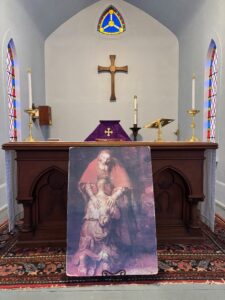
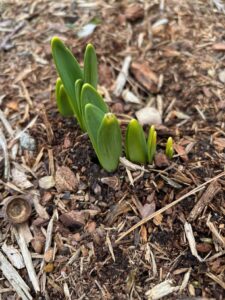 Is our society like the prodigal son, wandering far in a land that is waste? It sure feels that way. So how sweet it is to reach the story’s next line, its turning point: “When he came to himself…” (Luke 15:17). The young man comes to himself, he turns, and he starts to travel home. That’s such a great line: “He came to himself.” It’s as if he began to wake up, he began to break through the spell, he remembered who he was: someone created to love himself and his neighbor, to love the natural world, to love God. When we come to ourselves, we begin to make the journey home to God. Our basic nature, our truest nature, is found as we turn and head toward God, our divine Father and Mother, the lover of our souls and the source of all life.
What would it look like if we, as a society, “came to ourselves”? Maybe it would mean turning away from the illusion that we are separate from each other and must go it alone. Maybe it would mean taking hold of the truth that we belong to each other, that we belong to the Earth that sustains everything that lives, that we are made for connection and community. I can think of no more beautiful way to spend one’s life than to take part in what leaders like Joanna Macy and David C. Korten call the Great Turning, the epic transition from a deathly society to one that fosters life. That’s what philosopher Thomas Berry called the Great Work: our wholehearted effort to create a more just and sustainable world. And that’s what Archbishop Desmond Tutu called the “supreme work” of Jesus Christ: to reconcile us to God and to each other and to the whole of God’s Creation.4
In a time of such divisiveness and uncertainty, it’s powerful to remember that God loves it when we come to ourselves and begin the journey home to God. God gets happy when we make that turn, even if we’ve still got a long way to go. That’s what we see in the next part of the parable: The father, who seems to have been waiting eagerly for his son’s return, catches sight of him while he is “still far off.” “Filled with compassion” (Luke 15:20), he runs out to greet him. It’s completely undignified, this decisive moment when the old man hikes his robe above his shins and runs, breathing hard, sandals slapping and forehead perspiring, until he reaches his son and catches him up in his arms.
That moment of reunion is the one that Rembrandt portrays. It is a wordless moment, a moment of enormous stillness, in which the gentle arms of the father embrace the repentant son and draw him close. Can you imagine those kind hands on your shoulders? Can you imagine your face sheltered in the shadow of that warm red cloak, resting against the father’s loving heart? Our souls long for that experience of acceptance, forgiveness, and reconciliation. We may need to gaze at that scene for a long time until we can really take it in.
The repentant son tries to launch into his long apology, but the father will have none of it. He wants to throw a party. It’s all about joy – the father’s joy and the joy of the repentant son. Meanwhile, in the painting, the elder son, who resents his young and dissolute brother, stands in the shadows. He feels left out of the party, when – hey! – he was the brother who did everything right! He followed the rules! It’s not fair! But he, too, is deeply loved and invited to the table to share in the joy.
“My son,” says the father to the angry elder son, “you are always with me, and all that is mine is yours” (Luke 15:31). “Come home,” the father is saying. “I have always loved you, and my love for your brother in no way diminishes my love for you.”
That’s the scandal of the father’s love – and the scandal of the Eucharist, as well – for everyone is welcome to the feast, prodigal and respectable alike, all of us equally needing and equally embraced by the unconditional love of God. It’s a meal that can transform our consciousness and shift the axis of the self, so that we discover our center, our true self, in the unmerited and boundless love of God.
So – as a Celtic prayer puts it – come to the table of Christ, “you who feel weak and unworthy, you who come often and you who have stayed away. Come, you who love him and you who wish you could. Come, you who are hungry for friendship or forgiveness. Come, you who long for meaning or a just world.”5
Come. The Father is waiting for you, arms outstretched.
______________________________________________________________________________________________________
1. Ronald H. Love, “Are we willing to throw a feast?”, SermonSuite.
2. Henri J.M Nouwen, The Return of the Prodigal Son: A Meditation on Fathers, Brothers, and Sons (NY: Doubleday, 1992).
3. The Book of Common Prayer (The Seabury Press, 1979), 450.
4. Archbishop Desmond Tutu, Foreword, The Green Bible, New Revised Standard Version (New York: HarperOne, HarperCollins, 2008), I-14
5. Ray Simpson, Healing the Land: Natural Seasons, Sacraments, and Special Services, The Celtic Prayer Book, Volume 3 (Suffolk, England: Kevin Mayhew, 2004), 154, based on a prayer of the Iona Community.
Is our society like the prodigal son, wandering far in a land that is waste? It sure feels that way. So how sweet it is to reach the story’s next line, its turning point: “When he came to himself…” (Luke 15:17). The young man comes to himself, he turns, and he starts to travel home. That’s such a great line: “He came to himself.” It’s as if he began to wake up, he began to break through the spell, he remembered who he was: someone created to love himself and his neighbor, to love the natural world, to love God. When we come to ourselves, we begin to make the journey home to God. Our basic nature, our truest nature, is found as we turn and head toward God, our divine Father and Mother, the lover of our souls and the source of all life.
What would it look like if we, as a society, “came to ourselves”? Maybe it would mean turning away from the illusion that we are separate from each other and must go it alone. Maybe it would mean taking hold of the truth that we belong to each other, that we belong to the Earth that sustains everything that lives, that we are made for connection and community. I can think of no more beautiful way to spend one’s life than to take part in what leaders like Joanna Macy and David C. Korten call the Great Turning, the epic transition from a deathly society to one that fosters life. That’s what philosopher Thomas Berry called the Great Work: our wholehearted effort to create a more just and sustainable world. And that’s what Archbishop Desmond Tutu called the “supreme work” of Jesus Christ: to reconcile us to God and to each other and to the whole of God’s Creation.4
In a time of such divisiveness and uncertainty, it’s powerful to remember that God loves it when we come to ourselves and begin the journey home to God. God gets happy when we make that turn, even if we’ve still got a long way to go. That’s what we see in the next part of the parable: The father, who seems to have been waiting eagerly for his son’s return, catches sight of him while he is “still far off.” “Filled with compassion” (Luke 15:20), he runs out to greet him. It’s completely undignified, this decisive moment when the old man hikes his robe above his shins and runs, breathing hard, sandals slapping and forehead perspiring, until he reaches his son and catches him up in his arms.
That moment of reunion is the one that Rembrandt portrays. It is a wordless moment, a moment of enormous stillness, in which the gentle arms of the father embrace the repentant son and draw him close. Can you imagine those kind hands on your shoulders? Can you imagine your face sheltered in the shadow of that warm red cloak, resting against the father’s loving heart? Our souls long for that experience of acceptance, forgiveness, and reconciliation. We may need to gaze at that scene for a long time until we can really take it in.
The repentant son tries to launch into his long apology, but the father will have none of it. He wants to throw a party. It’s all about joy – the father’s joy and the joy of the repentant son. Meanwhile, in the painting, the elder son, who resents his young and dissolute brother, stands in the shadows. He feels left out of the party, when – hey! – he was the brother who did everything right! He followed the rules! It’s not fair! But he, too, is deeply loved and invited to the table to share in the joy.
“My son,” says the father to the angry elder son, “you are always with me, and all that is mine is yours” (Luke 15:31). “Come home,” the father is saying. “I have always loved you, and my love for your brother in no way diminishes my love for you.”
That’s the scandal of the father’s love – and the scandal of the Eucharist, as well – for everyone is welcome to the feast, prodigal and respectable alike, all of us equally needing and equally embraced by the unconditional love of God. It’s a meal that can transform our consciousness and shift the axis of the self, so that we discover our center, our true self, in the unmerited and boundless love of God.
So – as a Celtic prayer puts it – come to the table of Christ, “you who feel weak and unworthy, you who come often and you who have stayed away. Come, you who love him and you who wish you could. Come, you who are hungry for friendship or forgiveness. Come, you who long for meaning or a just world.”5
Come. The Father is waiting for you, arms outstretched.
______________________________________________________________________________________________________
1. Ronald H. Love, “Are we willing to throw a feast?”, SermonSuite.
2. Henri J.M Nouwen, The Return of the Prodigal Son: A Meditation on Fathers, Brothers, and Sons (NY: Doubleday, 1992).
3. The Book of Common Prayer (The Seabury Press, 1979), 450.
4. Archbishop Desmond Tutu, Foreword, The Green Bible, New Revised Standard Version (New York: HarperOne, HarperCollins, 2008), I-14
5. Ray Simpson, Healing the Land: Natural Seasons, Sacraments, and Special Services, The Celtic Prayer Book, Volume 3 (Suffolk, England: Kevin Mayhew, 2004), 154, based on a prayer of the Iona Community. 